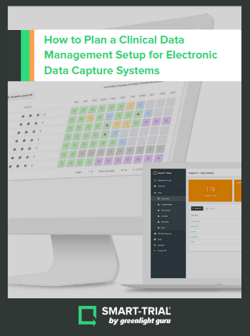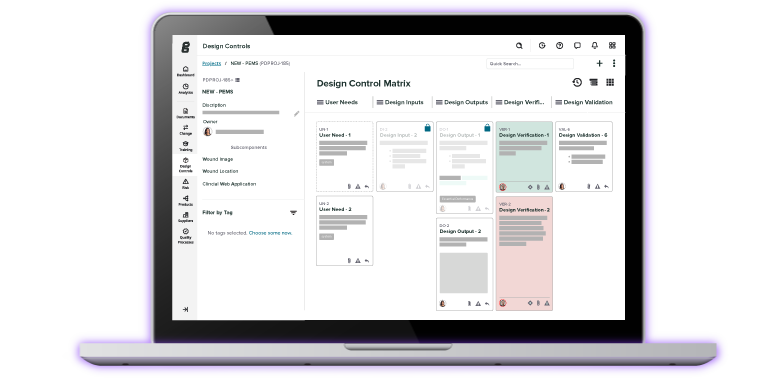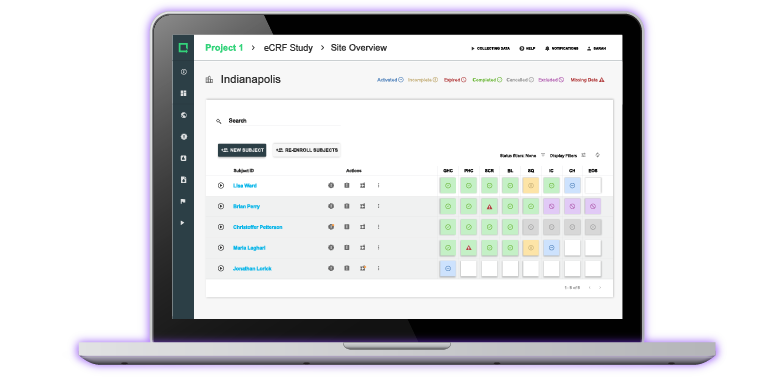How to Plan a Clinical Data Management Setup for EDC Systems

When it comes to setting up forms and questionnaires for electronic data capture (EDC) systems, we’ve noticed a trend. Most are keen to get their study started but have not considered what it takes to set up a study. The time from set up to study start is prolonged due to lack of planning, which affects the overall project plan.
Lack of planning, testing, and requirement specification can cause problems such as miscommunication, missing data, and delays. Efficient setup of a study with minimal delay can resolve many of these problems, and the key to an efficient setup is to design a specific data management plan or study setup plan.
If done correctly, data collection is initiated on time, and teams can collect required data without adding burden to existing workflows. The following sections are a sneak peek into our white paper "How to Plan a Clinical Data Management Setup for EDC Systems."
Mise en place
Mise en place is a French culinary phrase which means “putting in place”, or “everything in its place”. This phrase and its mentality are applicable to data management as well. Quality data collection begins quicker as more requirements are prepared before setup.
Start with roles
Clinical teams include groups of diverse people with different expertise and experience, most being clinical professionals. But there are many roles that come into play at different phases of a study, e.g. those who handle the data management.
A few roles to consider for your data management plan:
- Who is responsible for setting up the data management solution? If many bear this responsibility, who should be responsible for what area of the setup? Forms, process, questions, etc.?
- Who should be responsible for translating?
- Who should be involved in testing the setup? An external tester is highly recommended.
Once you have considered roles you can move on to the main ingredients.
Prepare the ''main ingredients''
All studies have one thing in common: one or more endpoints. To drive a successful study you will have to define a hypothesis. These endpoints will depict if the hypothesis is true, or false. One or more variables define the endpoints, and these variables are collected through forms and questionnaires. The ''main ingredients'' consist of the variables and the context in which to collect.
Furthermore, a few steps to follow that help specify the variables and forms or questionnaires you need.
- Define the answer possibilities for your questions. This will simplify the input and return more quantifiable data. Free text, for the most part, is not ideal, because it requires cleaning, and can increase the risk of erroneous input. Read our eBook on ''7 Principles to Designing an eCRF.''
The white paper goes into depth about each ingredient. Below is an example of one of the ingredients.
The Data Entry role - who handles capturing data?
The usual answer would be study personnel. But, data capture happens via computers, tablets, or smart-phones. So consider if the solution allows for data capture from subjects.
A good example is subject-specific questionnaires, which are often designed to capture patient-reported outcomes, or clinical outcome assessments. Check if you want to provide subjects the option to complete questionnaires at home.
We’ve seen results from projects that have utilized such features, and, subject compliance has risen from below 50% to above 80%.
This requires questionnaires to be well-designed to avoid subject confusion and fatigue. Thorough testing can resolve these problems.
Data management plan - a checklist
We have generated a checklist to help you plan. Ask those involved with study design the right questions to streamline and structure the planning process.
We are aware that not all the items listed above are applicable to every study. But, can rather serve as a general guideline. Below mentioned are a few points from the checklist.
- Define roles and tasks for the whole data management plan.
- Specify the timing for subject questionnaires, reminders, and possible time limits for completing questionnaires.
- Define who should capture what data.
- Be critical of what data to collect. Review/revise with healthcare professionals more than once.
Design a setup plan that will allow the entire process to run smoother and save time, money, and frustrations.
This white paper is for both veterans and first-time users of data collection tools. Download your copy and get access to all the "ingredients" and the checklist to help you plan your setup.
Greenlight Guru Clinical is the only EDC System made for MedTech
What does this mean? Our Electronic Data Capture (EDC) solution is engineered with the medical device workflow in mind. One of the differences between drug and medical devices studies is what data needs to be collected and how.
With Greenlight Guru Clinical, MedTech companies receive a solution made to support them rather than hinder them in their clinical data management. Our system is flexible and easily scalable so that it can adapt to MedTech study designs and data collection requirements. This is not the case with other EDC systems on the market. They are first and foremost made for pharma-specific trials.
We offer advice and assistance in setting up studies inside our EDC system, exactly for this reason: MedTech operations are different than pharmaceuticals. Our solution is made to support MedTech companies. Ready to learn more? Contact us today for a customized demo.
Páll Jóhannesson, M.Sc. in Medical Market Access, was the founder and former CEO of Greenlight Guru Clinical (formerly SMART-TRIAL) and is currently the EVP of Europe at Greenlight Guru.
Read More Posts
Clinical Trials in 2025: The Outlook for Medical Device Companies
What’s New in Greenlight Guru Clinical 2025.1: Smarter Show Rules and Easier File Vault Access
The Biggest Quality Challenges for Medical Device Companies in 2025
Get your free eBook PDF
How to Plan a Clinical Data Management Setup for EDC Systems


.png?width=2318&name=How%20to%20Plan%20a%20Clinical%20Data%20Management%20Setup%20for%20EDC%20Systems%20(new).png)







